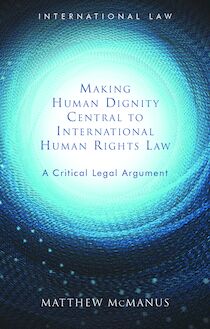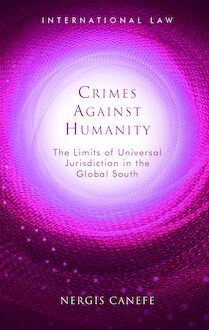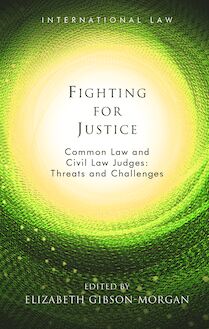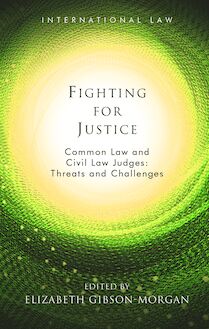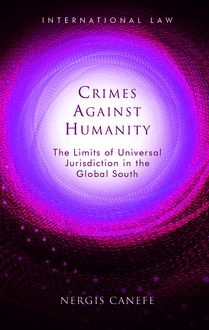Making Human Dignity Central to International Human Rights Law , livre ebook
155
pages
English
Ebooks
2019
Vous pourrez modifier la taille du texte de cet ouvrage
Obtenez un accès à la bibliothèque pour le consulter en ligne En savoir plus
Découvre YouScribe en t'inscrivant gratuitement
Découvre YouScribe en t'inscrivant gratuitement
155
pages
English
Ebooks
2019
Vous pourrez modifier la taille du texte de cet ouvrage
Obtenez un accès à la bibliothèque pour le consulter en ligne En savoir plus
Publié par
Date de parution
15 septembre 2019
Nombre de lectures
1
EAN13
9781786834669
Langue
English
Poids de l'ouvrage
1 Mo
In recent years, there has been an explosion of writing on the topic of human dignity across a plethora of different academic disciplines. Despite this explosion of interest, there is one group – critical legal scholars – that has devoted little if any attention to human dignity. This book argues that these scholars should attend to human dignity, a concept rich enough to support a whole range of progressive ambitions, particularly in the field of international law. It synthesizes certain liberal arguments about the good of self-authorship with the critical legal philosophy of Roberto Unger and the capabilities approach to agency of Amartya Sen, to formulate a unique conception of human dignity. The author argues how human dignity flows from an individual’s capacity for self-authorship as defined by the set of expressive capabilities s/he possesses, and the book demonstrates how this conception can enrich our understanding of international human rights law by making the amplification of human dignity its fundamental orientation.
Acknowledgements
1. Overview of the Project
PART I: Theorizing the relationship between human dignity and international human rights law
2. Dignity’s Contentious History
3. A Critical Legal Conception of Human Dignity
4. The State, International Human Rights Law and the Amplification of Human Dignity in Practice
PART II: Realizing human dignity in the practice of international human rights law
5. Realizing Human Dignity Through Amplifying Democratic Rights
6. Realizing Human Dignity Through Establishing Rights to an Equality of Expressive Capabilities
7. Concluding Remarks on What it Means to Overcome False Necessity
Notes
Bibliography
Index
Publié par
Date de parution
15 septembre 2019
Nombre de lectures
1
EAN13
9781786834669
Langue
English
Poids de l'ouvrage
1 Mo
INTERNATIONAL LAW
Making Human Dignity Central to International Human Rights Law
Series Editors
Diane Marie Amann
University of Georgia
Yvonne McDermott
Swansea University
Editorial Board
Simon Chesterman
National University of Singapore
Fiona de Londras
University of Birmingham
Fionnuala Ní Aoláin
Queens University, Belfast and University of Minnesota
Ryszard Piotrowicz
Aberystwyth University
Volker Roeben
University of Dundee
Carsten Stahn
Leiden University
INTERNATIONAL LAW
Making Human Dignity Central to International Human Rights Law
A Critical Legal Argument
MATTHEW M c MANUS -->
UNIVERSITY OF WALES PRESS 2019
© Matthew McManus, 2019
All rights reserved. No part of this book may be reproduced in any material form (including photocopying or storing it in any medium by electronic means and whether or not transiently or incidentally to some other use of this publication) without the written permission of the copyright owner except in accordance with the provisions of the Copyright, Designs and Patents Act 1988. Applications for the copyright owner’s written permission to reproduce any part of this publication should be addressed to the University of Wales Press, University Registry, King Edward VII Avenue, Cardiff CF10 3NS.
www.uwp.co.uk
British Library CIP Data
A catalogue record for this book is available from the British Library.
ISBN 978-1-78683-464-5 eISBN 978-1-78683-466-9
The right of Matthew McManus to be identified as author of this work has been asserted in accordance with sections 77 and 79 of the Copyright, Designs and Patents Act 1988.
The publisher has no responsibility for the persistence or accuracy of URLs for any external or third-party internet websites referred to in this book, and does not guarantee that any content on such websites is, or will remain, accurate or appropriate.
Cover image: Black hole with spiral galaxy cosmic background © Freepik.
Dedicated to the Memory of Connor O’Callaghan With Love and Friendship
Series Preface
We are delighted to introduce the first title in the University of Wales Press’s International Law series. The series has been designed to capture dynamic and cutting-edge research in international law, with a strong focus on legal theory. It is supported by a distinguished Editorial Board, comprised of leading international law academics from around the world.
Matthew McManus’s Making Human Dignity Central to International Human Rights Law draws on a rich intellectual history to put forward a compelling argument. This book develops a unique theory of the concept of dignity, which it then applies to international human rights law. In so doing, it analyses legal and moral philosophy, critical legal studies, and key practical concerns in international human rights law. The author does not shy away from examining controversial areas of practice, nor from critically appraising the work of some of the leading authors in the field. The sophisticated debut monograph that results will no doubt leave readers keen to explore the author’s future writings.
This excellent book bodes very well for the future of this series, and we look forward to receiving many excellent proposals from scholars with an interest in theory and international law.
Professor Diane Marie Amann
University of Georgia
Professor Yvonne McDermott
Swansea University
June 2019
Contents
Acknowledgements
1 Overview of the Project
Introduction
Theoretical Orientation of the Project: the Importance of Amplifying Human Dignity
Application I: Making Human Dignity Central to International Human Rights Law
Application II: Reconceiving and Redirecting International Human Rights Law
Application III: Amplifying Human Dignity in Practice
PART I: Theorizing the relationship between human dignity and international human rights law
2 Dignity’s Contentious History
Human Dignity: Origins and Orientation
The Kantian Conception of Human Dignity
Criticisms of the Kantian Conception
Samuel Moyn on Dignity’s Secret Catholicism
The Internationalization of Dignity
Providing New Theoretical Frameworks for Human Dignity
Critical Legal Studies and Human Dignity
3 A Critical Legal Conception of Human Dignity
The Need for a New Conception of Human Dignity
Dignified Self-Authorship
Dignity and Expressive Capabilities
Why Dignified Self-Authorship is Important
A Critical Legal Model of Rights
4 The State, International Human Rights Law and the Amplification of Human Dignity in Practice
Introduction: Critical Legal Theory, Human Rights and International Human Rights Law
A Very Brief History of International Human Rights Law and the State
Theorizing a New Relationship between International Human Rights Law and the State
I: A Reply to Schmittian Arguments
II: International Human Rights Law and the Establishment of the Rightful Condition
International Human Rights Law and the Twinned Rights: Bringing the Domestic and the International Together
The Rights of Non-Citizens
International Human Rights Law as a Steering Mechanism for Realizing Human Dignity
PART II: Realizing human dignity in the practice of international human rights law
5 Realizing Human Dignity Through Amplifying Democratic Rights
Introduction
Expanding Voting Rights: Aziz v Cyprus
Establishing the Rightful Condition for All: Hirst v United Kingdom
Developing Democratic Institutions: Riza and Others v Bulgaria
Conclusion: the Potential of International Human Rights Law to Establish the Rightful Condition Through Respecting the Right to Democratic Self-Authorship
6 Realizing Human Dignity Through Establishing Rights to an Equality of Expressive Capabilities
Introduction: What Does a Right to an Equality of Expressive Capabilities Mean in Practice?
DH v Czech Republic and Securing the Right to an Education
The Right to Housing: Government of South Africa and Others v Grootboom
Can the Economic, Social and Cultural Rights of Non-Citizens be Made Justiciable?
7 Concluding Remarks on What it Means to Overcome False Necessity
Notes
Bibliography
Acknowledgements
This book (my first) has roots that go back quite some way. The initial argument about human dignity and law has its roots in my doctoral thesis, which I began to work on seriously when I was in my mid-twenties. Having now hit the age of thirty, it has become clearer tome how many people are actually involved in supporting, guiding and criticizing an author before the text even goes to print. This disposition might have surprised my younger self, who spent a healthy chunk of his time sitting on his roommate’s couch, largely determined to ignore the world outside as much as possible. That is a rather odd attitude to take for someone concerned about human rights and law, which are inherently social phenomena of tremendous concern to millions around the globe. I hope that these acknowledgements can make up for such youthful apathy.
First, I need to thank those who guided my academic career from the start, and abetted me in the weird task of moving from undergraduate to professor via a thesis. This includes my high school teachers, Margie Barkley and Cameron Jones; and my undergraduate teachers at Carleton University, Dr Amy Bartholomew and Dr Ratna Rueban Balasubramaniam. I thank the Canadian Council of International Law for supporting my early interest in the subject. Special thanks are due to Dr Trevor Purvis, who supervised my undergraduate project and who remains a good friend and mentor to this day. Thank you to Kathleen at the National University of Ireland for her ongoing mentorship. Given my almost six years at York University, it is almost impossible to pin down who warrants gratitude. I thank the administrators and faculty of the Socio-Legal Programme there for their support and guidance – especially Dr Annie Bunting, who first encouraged me to go to York; Dr Nalini Persram, for guidance and kindness; Dena Demos, for her mentorship; and Dr Jay Goulding, for many interesting conversations (and not a few free drinks). I also thank my colleagues in the graduate programme – especially Mariful Alam, Ali Malik, Daniel Zenga and Emily Lockhart – for many fond memories. I thank my colleagues Christopher Satoor, Dylan DeJong, Erik Tate and Victor Hainagiu foreven more good memories, and Paul Barnes for looking over early versions of this work. I thank the staff of New Jurist magazine, Merion West , The McGill International Review , Entretextos and the Journal of Human Rights for publishing early versions of these arguments that made their way into the manuscript. Where there is overlap between these earlier pieces and the manuscript, it has been reprinted with permission. Aspecial thank-you goes to my supervisor, Dr Lesley Jacobs, for many years of patient guidance and assistance: I learnt a great deal from her. I thank my committee members, Dr Willem Maas and Dr Allan Hutchinson, and everyone else who looked at earlier iterations of the dissertation; Dr Yvonne McDermott Rees for her early assistance in having my manuscript proposal reviewed; and the staff working with the Committee for International Justice and Accountability who were my colleagues during the early proposal process. I thank you Plan Canada, Aden Earthworks, Chapters and many other employers for helping me to keep a roof over my head. I thank countless students at York University; Tec de Monterrey, who helped me to hone my ideas through years of teaching and is owed a great deal of gratitude for offering me my first academic position teaching politics and international relations; and our Director, Dr Juan Cruz.
Of course, the personal debts of an author are always more complex and difficult to define, but I would like to thank: Andrew Thorndyke, Shefali Sarna, Justin Unsworth, Taewook Kim, Stacey Freeman, Jeffrey Farncombe, James Bowden, Brendan Nickels, Tristan Bradley, Nolan Belleville, Sam Jowett,
